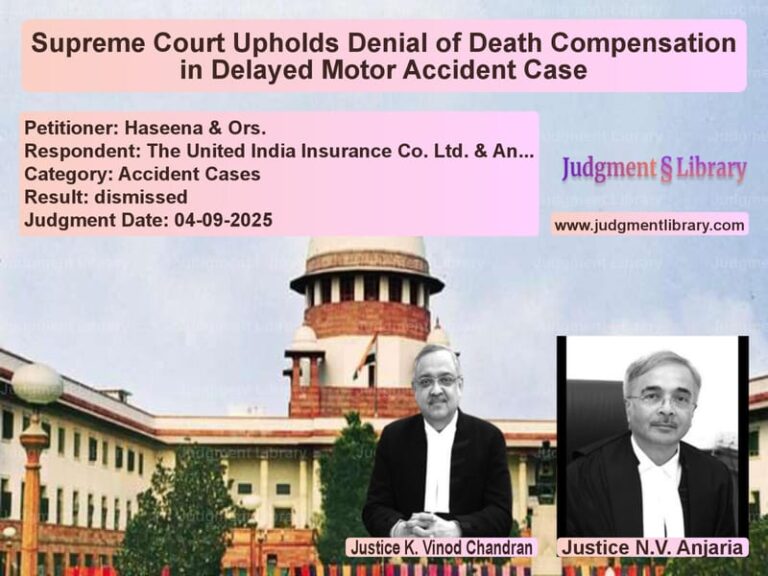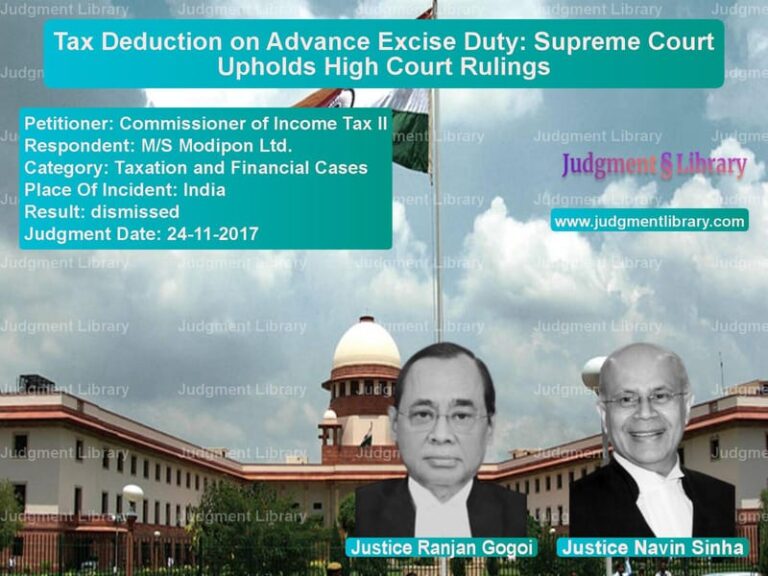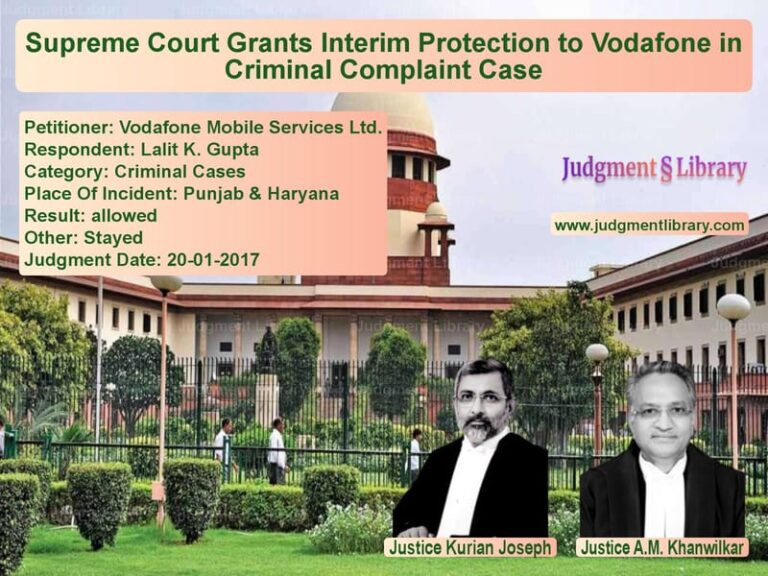Supreme Court Upholds Life Imprisonment in Mukhtar Ahmed Murder Case
The case of Farida Begum vs. State of Uttarakhand revolves around the brutal murder of Mukhtar Ahmed in 1999, leading to the conviction of multiple accused under Sections 302/149, 147, and 148 of the Indian Penal Code (IPC). The Supreme Court upheld the conviction of the primary accused while acquitting two others by granting them the benefit of doubt.
The appeals challenged the Uttarakhand High Court’s decision, which affirmed the trial court’s ruling convicting the accused of murder. The Supreme Court extensively reviewed the evidence, eyewitness testimonies, and forensic findings before delivering its final judgment.
Background of the Case
The prosecution’s case originated from an FIR lodged on 1 July 1999 at Jaspur, Udham Singh Nagar, Uttarakhand. The complainant, Shahid Hussain, stated that he, along with Mukhtar Ahmed and Mohammad Rafi, was present at the house of one Rafiq Ahmed (Dildar) after offering their evening prayers.
At around 8:20 PM, a group of accused, including Farida Begum (A1), Mohammad Ashraf (A2), Raees Ahmed (A4), Raees Ahmed @ Satna (A5), Mohammad Aslam (A3), Naseem @ Churti (A6), and Idrish (A7), stormed into the house. Two of the accused held Mukhtar Ahmed’s hands while two others restrained his legs. Witnesses testified that Farida Begum, a political figure in the area, instigated the attack by shouting:
“The son of Darji should be finished, and we will see how he removes me as Chairman of Nagar Palika.”
Following this incitement, Raees Ahmed, Raees Ahmed @ Satna, and Mohammad Ashraf fired at Mukhtar Ahmed, killing him instantly.
Trial Court’s Findings
The trial court found all the accused guilty under Sections 302/149 of the IPC and sentenced them to life imprisonment along with a fine. The court also convicted Farida Begum, Mohammad Naseem @ Churti, and Idrish under Section 147 of IPC, sentencing them to one year of rigorous imprisonment. Meanwhile, Mohammad Ashraf, Raees Ahmed, and Raees Ahmed @ Satna were sentenced to two years under Section 148 IPC.
High Court’s Decision
The convicted individuals appealed before the Uttarakhand High Court, which upheld the trial court’s judgment for most of the accused. However, the High Court acquitted Mohammad Naseem @ Churti and Idrish, granting them the benefit of doubt.
Arguments by the Appellants
The appellants, including Farida Begum (A1), Mohammad Ashraf (A2), and Raees Ahmed @ Satna (A5), challenged their conviction on the following grounds:
- The credibility of eyewitnesses Shahid Hussain (PW1) and Mohammad Rafi (PW2) was questionable due to inconsistencies in their statements.
- The alleged motive—political rivalry—was unsubstantiated.
- The prosecution failed to prove beyond doubt that the accused had fired the fatal shots.
- The trial court and High Court erred in not considering the lack of scientific evidence linking the accused to the murder.
- There were material contradictions regarding the availability of electricity at the crime scene, affecting witness visibility.
Arguments by the Prosecution
The prosecution countered that:
- The presence of Farida Begum at the crime scene and her incitement to kill the deceased were corroborated by multiple witnesses.
- The accused were identified at the scene of the crime, and the witness testimonies remained consistent in material aspects.
- The absence of a motive does not exonerate the accused if the crime is proven beyond doubt.
- The scientific evidence, including post-mortem reports, aligned with eyewitness accounts.
Supreme Court’s Judgment
The Supreme Court, comprising Justices N.V. Ramana, Mohan M. Shantanagoudar, and M.R. Shah, meticulously examined the evidence and arguments before delivering its ruling.
The Court upheld the conviction of Farida Begum (A1) and Mohammad Ashraf (A2), stating:
“The presence of the accused at the crime scene has been established and proven beyond doubt. The prosecution has successfully demonstrated that the appellants played a crucial role in orchestrating and executing the crime.”
However, the Court granted the benefit of doubt to Raees Ahmed (A4) and Raees Ahmed @ Satna (A5), stating that the prosecution had failed to conclusively establish their role in the shooting. The Court also noted that the High Court had acquitted Accused Nos. 6 and 7 on similar grounds, which warranted consistency in judgment.
Key Takeaways from the Judgment
- Role of Political Rivalry: The case underscored how political conflicts can escalate into violent crimes.
- Importance of Eyewitness Testimonies: The Court reaffirmed the reliability of eyewitness accounts when corroborated by circumstantial evidence.
- Application of Benefit of Doubt: The Court highlighted the need for consistent standards when granting acquittals based on lack of conclusive evidence.
- Reaffirmation of Section 149 IPC: The Court clarified that a conviction under Section 149 does not require individual participation but group involvement in an unlawful act.
Final Directions
The Supreme Court ruled:
- The conviction of Farida Begum (A1) and Mohammad Ashraf (A2) under Sections 302/149 IPC and other relevant sections was upheld.
- Their bail bonds were canceled, and they were ordered to surrender within two weeks.
- Raees Ahmed (A4) and Raees Ahmed @ Satna (A5) were acquitted, and their immediate release was ordered.
Conclusion
This case serves as a critical example of how courts evaluate direct and circumstantial evidence in murder trials. The judgment upholds the principles of justice while ensuring that those who benefit from the benefit of doubt are not wrongfully convicted. The Supreme Court’s ruling reinforces the importance of consistent judicial standards in cases involving multiple accused individuals.
Petitioner Name: Farida Begum.Respondent Name: State of Uttarakhand.Judgment By: Justice N.V. Ramana, Justice Mohan M. Shantanagoudar, Justice M.R. Shah.Place Of Incident: Udham Singh Nagar, Uttarakhand.Judgment Date: 04-12-2018.
Don’t miss out on the full details! Download the complete judgment in PDF format below and gain valuable insights instantly!
Download Judgment: Farida Begum vs State of Uttarakhand Supreme Court of India Judgment Dated 04-12-2018.pdf
Direct Downlaod Judgment: Direct downlaod this Judgment
See all petitions in Murder Cases
See all petitions in Attempt to Murder Cases
See all petitions in Extortion and Blackmail
See all petitions in Judgment by N.V. Ramana
See all petitions in Judgment by Mohan M. Shantanagoudar
See all petitions in Judgment by Mukeshkumar Rasikbhai Shah
See all petitions in partially allowed
See all petitions in Modified
See all petitions in supreme court of India judgments December 2018
See all petitions in 2018 judgments
See all posts in Criminal Cases Category
See all allowed petitions in Criminal Cases Category
See all Dismissed petitions in Criminal Cases Category
See all partially allowed petitions in Criminal Cases Category







